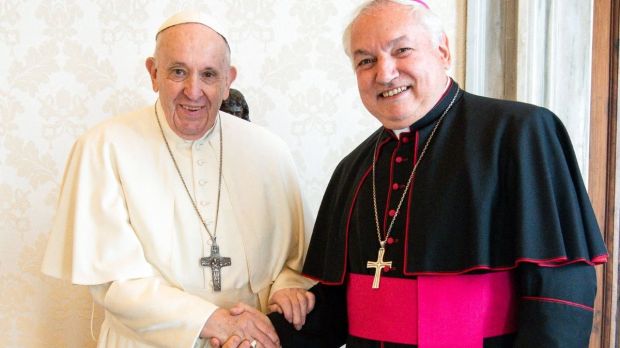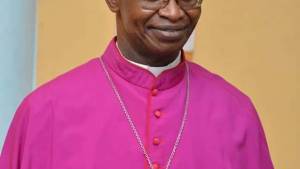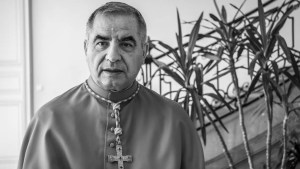The Archbishop of Marseille, France, Jean-Marc Aveline, is among the 16 new cardinal electors. By choosing to elevate this native of Algeria to the highest rank of the Catholic Church, the Pope has shown his esteem for a prelate who defends a “happy Mediterranean” where migration is first and foremost an enrichment.
At 63 years of age, Archbishop Jean-Marc Aveline joins the four other French cardinals under 80 years of age who will be among those responsible for electing a new pope in the event of a conclave—Dominique Mamberti, Philippe Barbarin, Jean-Pierre Ricard, and André Vingt-Trois.
On May 15, the archbishop of the city in southern France came to Rome to attend the canonizations of 10 blesseds, including the Frenchman Charles de Foucauld. The day before, he had brilliantly recounted the life of the French saint during a conference held at the French church of Trinitià dei Monti in Rome.
In April 2021, Bishop Aveline met with Pope Francis for nearly an hour face to face. “This was a first,” he said after an audience in which the two men spoke at length about the “theology of the Mediterranean,” the idea that dialogue and exchange between the peoples of the Mediterranean region should make it possible to unfold “a great tent of peace.”
A “Mediterranean” profile that touched the Pope
Obviously, Pope Francis was touched by this warm pastor with a singular background, a “Mediterranean” profile that had an impact on the Argentine pontiff.
Jean-Marc Aveline was born in French Algeria in Sidi Bel Abbès in 1958. His family, pieds noirs from Andalusia, settled there at the end of the 19th century. The prelate from Marseille likes to recall that they “came there to flee famine and to look for work at a time when the migratory flows in the Mediterranean tended to go from the North to the South.”
He himself barely knew the “plateaus of brown earth in southern Oran” where his family took root for nearly half a century: the Algerian War and the Evian Accords motivated them, like so many others, to flee. He remembers the violence of that time, the “stray bullets” that shattered the windows of their family apartment. At the age of four, he crossed the Mare Nostrum, leaving behind a “family history […] with its happy memories and painful scars” which, clearly, marked him radically.
After a few years spent in Paris, where his father, a cabinetmaker, found work in the railroads, he moved to Marseille. There, Jean-Marc Aveline had a happy childhood in the working-class neighborhoods of the city. He lived in the Northern Quarters, in Saint-Barthélémy, in a low-cost housing development built for SNCF employees. His parents were Catholics and his father volunteered at a French affiliate of Caritas, an example that marked him. A good student, he was admitted to the Lycée Victor Hugo, where he obtained a scientific diploma in 1975 before entering the prestigious Lycée Thiers in preparatory classes. He passed the competitive exams and was about to continue his studies, but then he remembered a “little song” that had been playing in his head since he was 8 or 9 years old: the idea of becoming a priest.
At the beginning of the summer, he went on an eight-day retreat in a Provençal monastery where he prayed in silence—an ordeal for him, as he was naturally rather exuberant. Back in Marseille, he met a priest who asked him when he would be entering the seminary. Without really thinking, the young man answered “in September.”
The beginning of his mission as a priest was particularly linked to teaching, a godsend for the man who dreamed of being a teacher. In September 1977, he entered the seminary of Avignon, where he remained until 1979. He then went to the Carmelite seminary in Paris, where he studied Greek and biblical Hebrew. In 1984, he was ordained a priest and continued his studies for two years. In 1986, he finally returned to Marseille. A professor at the seminary and then curate in a downtown parish, he was entrusted with the responsibility of vocations for the diocese in 1991.
In 1992, he created the Institute of Science and Theology of Religion (ISTR), of which he remained director until 2002. He was also entrusted with the reins of the Saint-Jean institution and a course at the Faculty of Theology of the Catholic University of Lyon. In 2007, he was chosen to become Vicar General of the Archdiocese of Marseille.
It was then that he was called to come to Rome as a consultant to the Pontifical Council for Interreligious Dialogue. “Inter-religious dialogue was not what I had prepared for, nor my taste. But life, often, enlightens us long afterwards regarding coherences that had escaped us… This experience changed my life,” he told La Provence in 2019. In 2013, he was appointed by Pope Francis to his home diocese, in Marseille, as an auxiliary bishop.
One of the most “Bergoglian” bishops in France
Six years later, the Argentine pontiff entrusted him with the mission of succeeding Archbishop Georges Pontier, who was retiring. Seen as one of the most “Bergoglian” bishops in France, his appointment makes this French bishop one of the privileged bridges between France and Rome, even though he doesn’t speak Italian. It was to him that his confreres recently turned in an unsuccessful attempt to have Pope Francis come to Marseille this fall. He told I.MEDIA that if the Pope “were to come to France, Marseille would be on the agenda.”
Pope Francis and the future cardinal share a certain vision of the mission of the Catholic Church in the Mediterranean, including peaceful dialogue with Islam, and fraternity and solidarity with the other shore. “Marseille is more than a city: it is a message! A message where distress is mixed with hope,” he said to the President of the Republic Emmanuel Macron during his visit to his city in August 2021, at a time when the spotlight was on the persistent security problems of the Provençal port.
“Message”: a term often used by Pope Francis—himself having borrowed it from John Paul II—to evoke another Mediterranean reality: that of Lebanon. Thus, Pope Francis has undoubtedly been seduced above all by the Mediterranean dimension of the archbishop.



